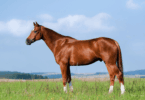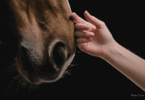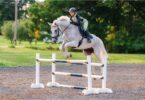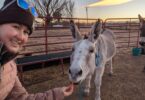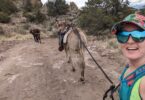Safety Tips for Off-Property Adventures
Riding in your home arena is a relatively safe way to learn the basics and progress with your horsemanship. However, some riders will want to push the boundaries and explore further.
Whether this includes your nearby bridle paths, regional trails, horse shows, or even out-of-state travel, there are many places you can go with your horse.
Getting to your location safely is important, but so is safety in an unfamiliar place. We’ll discuss safety considerations, emergency preparedness, and techniques to make off-the-farm experiences fun for all.

Source: Canva
Whether you are going for a trail ride or to a horse show, it is important to follow a few best practices to ensure a safe experience for both you and your horse:
- Tell someone where you are going and when you plan to return
- Bring a first-aid kit for both you AND your horse
- Inspect tack and equipment for wear or signs of failure in advance of your trip; it is best to repair or replace items of concern before they cause a bigger problem
- Pack spares of critical equipment such as halters and lead ropes
- Bring extra feed and water just in case your plans change or you happen to get delayed or stranded
- Prepare for any and all weather conditions you may encounter
- Always wear your helmet!
Be aware of transportation laws and any requirements for traveling with horses.
For example, you may need a negative Coggins test, a certificate of veterinary inspection, or other health-related forms. Western states may require brand inspections if you are traveling away from home.
Some forms are only required if you are traveling across state lines. Specific venues may have stricter requirements.

Source: Canva
If you are
Some questions to ask include:
- Do you have a map?
- Does everyone know the area?
- What will you do if the weather changes?
- What will you do if a horse or human gets injured?
- Do you have the contact info for a local vet?
- What about emergency contacts for the people you are riding with?
- Will you have cell service?
- What will you do if something happens, and you don’t have cell service?
- What scenarios would cause the group to split up, versus sticking together?
- Does everyone have a first aid kit, or who is carrying the kit if shared? Is the group trained on how to use the items in the kit?
If you are frequently riding in areas without cell service, it may be helpful to invest in a satellite phone like the Garmin InReach, a communication device that can be used to call for help or communicate with friends or family when you are out of cell range.
For those who may want to trail ride alone, certain apps can help track your ride and location, sending alerts if something seems amiss.
- SafeRide by Seaver alerts loved ones if a fall is detected
- Equilab offers GPS tracking for your ride, including live location sharing
Creating a plan before your trip helps ensure everyone is on the same page and prepared should something go wrong.

Source: Canva
If you’re heading to a horse show for the first time, a few things to consider include:
- Arrive early so your horse can take in all the sights and sounds of a new location
- Consider reserving a stall for your horse so they have a safer place to relax than tying to a trailer
- Keep it simple: prioritize a fun, safe experience for all versus a heavy competitive schedule
Some horses will handle off-farm experiences better than others. It can take time, practice, and positive reinforcement to teach a horse to be calm and relaxed in different situations.
Your job, as a rider, is to create a safe space for your horse to confidently approach new challenges.
Know the signs that your horse may be ready to spook and practice techniques for how to ride through those nervous moments. It is beneficial to travel with other experienced riders who know you and your horse—they can help assist if a problem arises or simply provide moral support.
If both you and your horse are newer to out-of-arena riding, it may be a good idea to enlist an experienced rider to pilot your horse and borrow a more seasoned mount for yourself. This will allow you to both learn and build confidence while minimizing the risk for a bad experience, or worse.
You need to convey confidence to your horse—if you are nervous, it can create a nervous horse.

Source: Canva
Parting Thoughts
Getting off the farm is a great way to expand your riding horizons, build trust, and have fun! Just be sure to plan ahead to ensure everyone stays safe.
Sources:
Safety Guidelines for Horseback Riding on the Trails
Trail Riding Safety Essentials


